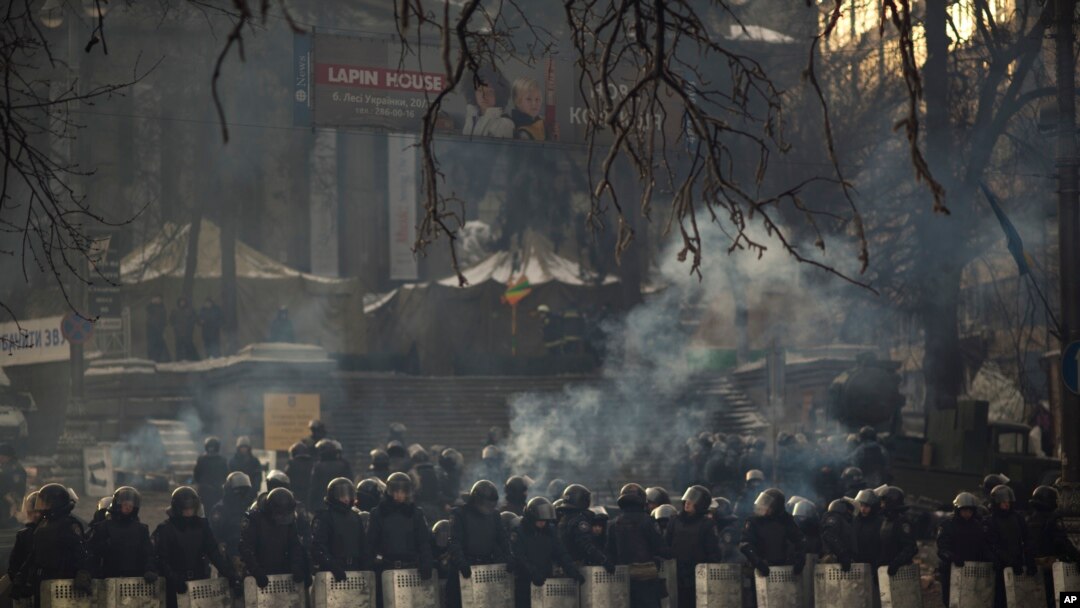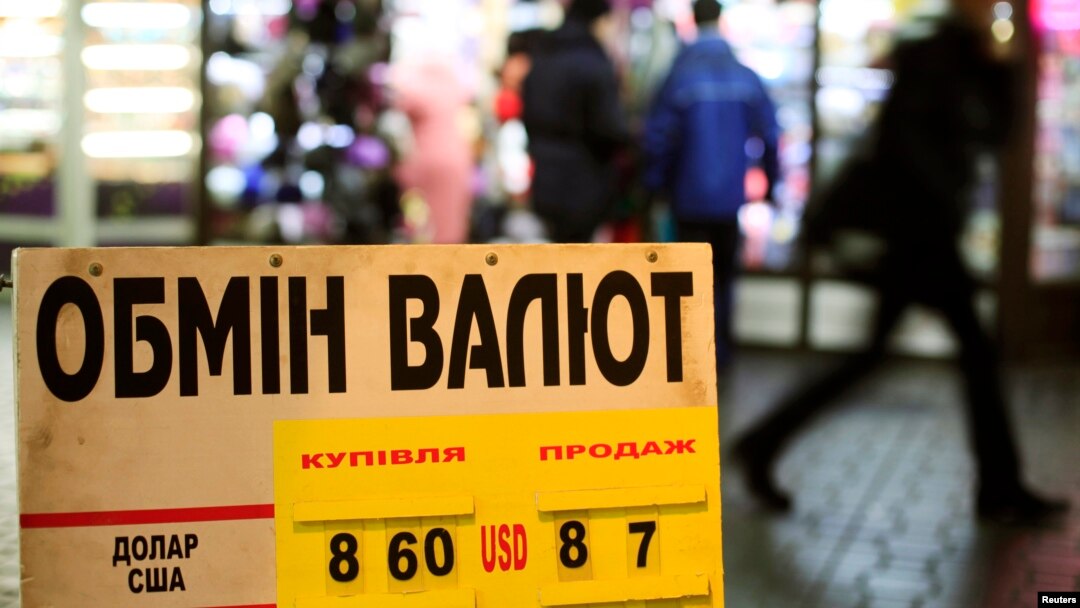KYIV —
Ukraine's acting prime minister blamed confrontation on the streets for a 10 percent slide in the currency since November that drove the hryvnia below nine to the dollar on Wednesday for the first time in five years.
For many analysts, it suggested the central bank would no longer prop up the currency amid a fight over Ukraine's future.
Torn between the European Union and Moscow since President Viktor Yanukovich spurned an EU trade deal in favor of Russian aid, Ukraine's leader was offered more carrots and sticks from east and west as he debated who may replace the pro-Russian premier he removed last week in a bid to appease his critics.
EU diplomacy chief Catherine Ashton, meeting Yanukovich and opposition leaders separately in Kyiv, urged them to hasten attempts to resolve a sometimes violent standoff and promised European economic and technical help to help with reforms.

The U.S. ambassador to Ukraine, speaking ahead of a visit this week by a senior State Department official, also warned that U.S. economic sanctions would follow swiftly if Yanukovich tried to clear central Kyiv's Maidan protest camp by force.
In Moscow, President Vladimir Putin's spokesman assured Ukraine that Russia would not review its terms for vital gas supplies - as long as Kyiv put right a growing pile of unpaid bills that was causing “concern” in the Kremlin.
It was a reminder, if one were needed, of how far Ukraine depends on Russian goodwill since Yanukovich agreed to take a $15-billion package of loans and cheaper gas. Russia froze payouts last week when Prime Minister Mykola Azarov stepped down and is waiting to see the color of the new government.
Yanukovich is expected to meet Putin at the opening of the Winter Olympics in Sochi on Friday - giving the Russian leader an opportunity for a private update on who will get the job.
A parliamentary ally of Yanukovich, whose power base lies among the industrial magnates of Ukraine's Russian-speaking eastern regions, said on Wednesday that the president might say next week who will take over as prime minister.
Currency Slide
Serhiy Arbuzov, the deputy premier currently heading the government on an interim basis, insisted the Ukrainian economy was in good shape and blamed politics for the weaker currency.
“Political instability is putting pressure on the currency market. There is tension despite a lack of economic reasons for this,” he told the cabinet in televised remarks.
“Every day of confrontation and a lack of desire to find a compromise weakens our country economically.”
In support of his argument that there was no economic cause for concern, he cited new data showing the balance of payments moved into a surplus of $2 billion by the end of last year.
The data indicate, however, that this was due to Russia buying $3 billion of eurobonds in December, as agreed with Putin. The broader current account deficit grew by 13 percent last year to $16.141 billion.
The central bank used reserves to try to maintain a stable peg for the hryvnia against the dollar and did so again on Wednesday, offering to auction dollars at 8.7 hryvnias. But on the interbank market, the rate fell 3 percent to below 9 - 10 percent weaker than before the EU deal collapsed in November.
Many analysts suggested the central bank was now giving up its efforts to hold the rate and that a drop to 10 per dollar or less could benefit the economy by making Ukraine's exports more competitive.
The indicative daily fixing rate, according to Thomson Reuters data, was 9.0850 hryvnias per dollar compared to Tuesday's 8.8025. The last time it fell below 9 per dollar was in February 2009, during a volatile period in the early months of the international financial crisis.
Bank of American Merrill Lynch analysts said the central bank seemed to have “abandoned” its peg. They forecast a rate of 10 hryvnias per dollar for this year, and hence a reduction in the current account deficit “to a more sustainable 3 percent of GDP”.
Tug-of-War
The European Union and United States have stressed they do want to partake in a “bidding war” with Russia for Ukraine, a huge territory of 46 million which Putin wants to join a customs union with other former Soviet republics. But both Brussels and Washington are urging closer relations on Kyiv.
Ashton said she believed a “Ukrainian-led process” of compromise and reform was possible to overcome the deadlock that has raised fears of instability spreading.
But, suggesting frustration at the lack of real compromise between the authorities and the opposition, she added: “What I really need to feel is a growing sense of momentum on this. I think that that is where we need to see more work.”
She played any suggestion there were “large dollops of money” on offer from the EU, but stressed broader cooperation.
U.S. Ambassador Geoffrey Pyatt told a Kyiv television channel that Washington welcomed Yanukovich's repeal last week of “black laws” aimed at curbing demonstrations and his dismissal of Azarov's government.
“We hope,” he added, ”That he will now take additional steps to rebuild consensus ... and build a broad technical government that can focus on returning Ukraine to political and economic health.”
For many analysts, it suggested the central bank would no longer prop up the currency amid a fight over Ukraine's future.
Torn between the European Union and Moscow since President Viktor Yanukovich spurned an EU trade deal in favor of Russian aid, Ukraine's leader was offered more carrots and sticks from east and west as he debated who may replace the pro-Russian premier he removed last week in a bid to appease his critics.
EU diplomacy chief Catherine Ashton, meeting Yanukovich and opposition leaders separately in Kyiv, urged them to hasten attempts to resolve a sometimes violent standoff and promised European economic and technical help to help with reforms.

Riot police officers take position outside Kyiv's Independence Square, the epicenter of the country's current unrest, Ukraine, Feb. 1, 2014.
The European Parliament, where lawmakers criticized the Ukrainian authorities for violence toward protesters and dozens of arrests, prepared to call on Thursday for sanctions - a call EU states are unlikely to heed at this stage in the hope that Yanukovich will choose to appoint a consensus government.The U.S. ambassador to Ukraine, speaking ahead of a visit this week by a senior State Department official, also warned that U.S. economic sanctions would follow swiftly if Yanukovich tried to clear central Kyiv's Maidan protest camp by force.
In Moscow, President Vladimir Putin's spokesman assured Ukraine that Russia would not review its terms for vital gas supplies - as long as Kyiv put right a growing pile of unpaid bills that was causing “concern” in the Kremlin.
It was a reminder, if one were needed, of how far Ukraine depends on Russian goodwill since Yanukovich agreed to take a $15-billion package of loans and cheaper gas. Russia froze payouts last week when Prime Minister Mykola Azarov stepped down and is waiting to see the color of the new government.
Yanukovich is expected to meet Putin at the opening of the Winter Olympics in Sochi on Friday - giving the Russian leader an opportunity for a private update on who will get the job.
A parliamentary ally of Yanukovich, whose power base lies among the industrial magnates of Ukraine's Russian-speaking eastern regions, said on Wednesday that the president might say next week who will take over as prime minister.
Currency Slide
Serhiy Arbuzov, the deputy premier currently heading the government on an interim basis, insisted the Ukrainian economy was in good shape and blamed politics for the weaker currency.
“Political instability is putting pressure on the currency market. There is tension despite a lack of economic reasons for this,” he told the cabinet in televised remarks.
“Every day of confrontation and a lack of desire to find a compromise weakens our country economically.”
In support of his argument that there was no economic cause for concern, he cited new data showing the balance of payments moved into a surplus of $2 billion by the end of last year.
The data indicate, however, that this was due to Russia buying $3 billion of eurobonds in December, as agreed with Putin. The broader current account deficit grew by 13 percent last year to $16.141 billion.
The central bank used reserves to try to maintain a stable peg for the hryvnia against the dollar and did so again on Wednesday, offering to auction dollars at 8.7 hryvnias. But on the interbank market, the rate fell 3 percent to below 9 - 10 percent weaker than before the EU deal collapsed in November.
Many analysts suggested the central bank was now giving up its efforts to hold the rate and that a drop to 10 per dollar or less could benefit the economy by making Ukraine's exports more competitive.
The indicative daily fixing rate, according to Thomson Reuters data, was 9.0850 hryvnias per dollar compared to Tuesday's 8.8025. The last time it fell below 9 per dollar was in February 2009, during a volatile period in the early months of the international financial crisis.
Bank of American Merrill Lynch analysts said the central bank seemed to have “abandoned” its peg. They forecast a rate of 10 hryvnias per dollar for this year, and hence a reduction in the current account deficit “to a more sustainable 3 percent of GDP”.
Tug-of-War
The European Union and United States have stressed they do want to partake in a “bidding war” with Russia for Ukraine, a huge territory of 46 million which Putin wants to join a customs union with other former Soviet republics. But both Brussels and Washington are urging closer relations on Kyiv.
Ashton said she believed a “Ukrainian-led process” of compromise and reform was possible to overcome the deadlock that has raised fears of instability spreading.
But, suggesting frustration at the lack of real compromise between the authorities and the opposition, she added: “What I really need to feel is a growing sense of momentum on this. I think that that is where we need to see more work.”
She played any suggestion there were “large dollops of money” on offer from the EU, but stressed broader cooperation.
U.S. Ambassador Geoffrey Pyatt told a Kyiv television channel that Washington welcomed Yanukovich's repeal last week of “black laws” aimed at curbing demonstrations and his dismissal of Azarov's government.
“We hope,” he added, ”That he will now take additional steps to rebuild consensus ... and build a broad technical government that can focus on returning Ukraine to political and economic health.”


